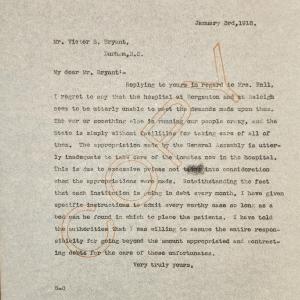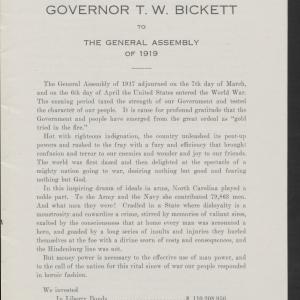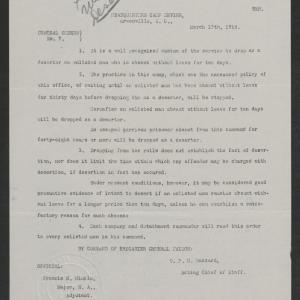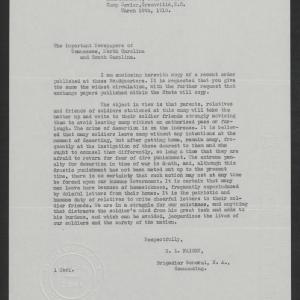- Transcription
August
Twenty-second
Nineteen eighteen
Hon. Newton D. Baker,
Secretary of War,
Washington, D.C.
My dear Mr. Baker:
Section 27 of the Selective Service regulations imposes upon the Governors of the several states the duty of enforcing the provisions of the Selective Service Law. The discharge of these duties has mept me in intimate contact with the people, and I think I am in a position to fairly interpret their thought with respect to the law.
In the beginning there was a vast deal of opposition, vastly more than the authorities at Washington realized. In this State I have given my very soul to laying before the people the everlasting justice and wisdom of the law. I did this when the bill was first proposed in Congress, and a long, long time before it became a law.
The people are now, in the main, reconciled to the law, and the only thing that has enabled us to rally them to the support of the law is that it is absolutely no respecter of persons but treats every one exactly alike.
I have read with grave misgivings the proposition to take young men who are in college out from under the jurisdiction of the local and district boards, and keep them in college for special training, subject to the call of the Government. I deem it my duty to you to say that such a policy would in North Carolina well-nigh breed a revolution. I have talked with members of the local boards and with the people of all classes, and the opinion is universally that such a policy would array the rank and file of the folks against the law. For example: A. is a small, one-horse, farmer; he has a son and is utterly unable to send him to the High School or to a college. Indeed, instead of being able to spend money to give the boy a college education, he feels that he is absolutely bound to have that boy in order to run the farm. The draft law stretches out its hand and takes that boy and sends him to the trenches in France. On the opposite side of the road lives a man who is a ten-horse farmer, prosperous, and well able to send his boy to the University. The draft law reaches out its hand and takes that boy and sends him to college, or keeps him there. You can at once see what a fierce class feeling will be engendered by a policy of this kind. In North Carolina a howl would go up from the mountains to the sea that all that is necessary to keep a man out of the war is for him to have money enough to go to college.
I do not under-estimate the value nor the necessity of having trained men, but the one thing that is a supreme necessity for the winning of this war is to keep the ninety-nine back of the principles of the selective service law. I sincerely trust that no policy will be adopted that will in any way take any man out of the jurisdiction and control of the local and district boards. When a call comes for a quota let every man who is registered, whether he be in college or out, be subject to the call and be sent to camp in his due order.
I am, by virtue of my office, chairman of the board of trustees of the University of this State. I am the Alumnus of another college in the State, and am deeply interested in these colleges, but, no matter what may be the consequences temporarily to these colleges, the Government cannot afford to make any distinction in favor of the man who is able to go to college and the man who is not. In all of my instructions to the local and district boards I have emphasized the fact that they may afford to make a mistake in keeping the son of a poor man at home, but that they cannot afford to make a mistake in keeping the son of a rich man at home. This principle applies with equal force to the policies of the Government. Up to this time we have been able to keep down the cry of the demagogue, that this is the rich man’s war and the poor man’s fight. There has been nothing in the administration of the law upon which to base any such claim, but if the college men are placed in a class to themselves, I fail to see how we can meet this charge that will surely be made.
Sincerely yours,
Governor.
P.S. As I am in frequent and direct communication with General Crowder, I have stated, in person, to him the substance of what I have written above to you.
Date:
Sender:
Recipient:
Related People:
Repository:
Collection:
Places:
»» »» Washington, D.C.






